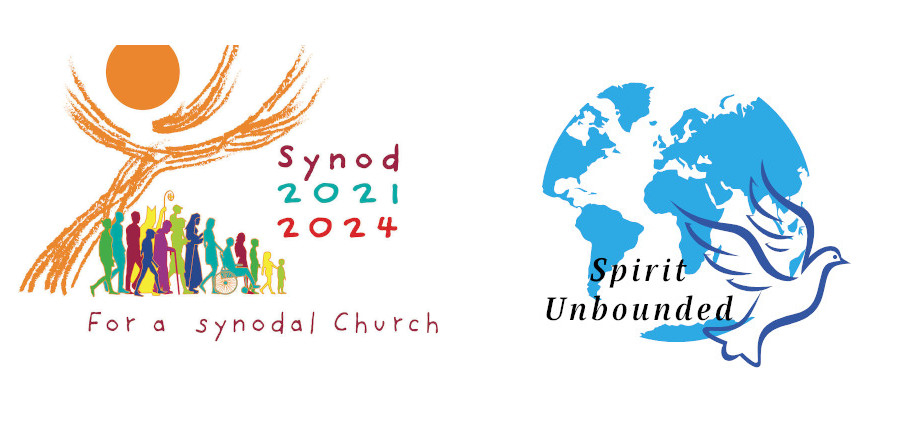Communio, Companionship, Consensus: Synod Report for October 14, 2023
The Synod concluded its second week today with delegates discussing section B.2 of the Instrumentum Laboris, “Co-responsibility in Mission,” Dr. Paolo Ruffini confirmed at a press briefing this morning.
Ruffini is the Prefect of the Vatican’s Dicastery for Communication and a participant in the Synod. The final reports on section B.2 will be presented by small groups on Tuesday evening, he said.
Sheila Pires, a member of the Synod’s communications team as well as a Synod delegate, reported that 340 delegates participated in today’s discussions. She said the assembly observed a moment of silence to pray for those affected by war.
Also speaking at the briefing were delegates Enrique Alarcón García, president of the Christian Fraternity of People with Disabilities of Spain; Sr. María de los Dolores Palencia Gómez, superior general of the Congregation of St. Joseph of Lyon who served as the presider over the assembly yesterday; and Fr. Mauro-Giuseppe Lepori, abbot general of the Cistercian Order.
Alarcón García said that the Synod has “filled my heart with joy.” It was “not just a gesture of tenderness” for the church to reach out to people with disabilities, he said, “but a way to make synodality credible.”
“We had never been asked what we thought, what we feel,” he continued, “to not even be able to enter a church because of architectural barriers.”
Alarcón García said that people with disabilities “are very much used to being excluded” and “patronized,” but this has not been the case at the Synod.
“The pope reminded us that we are full evangelizing members of the church,” he said.
For Sr. Gómez, who described her journey through life as “marked by peripheries,” the Synod has been “not just a matter of listening, [but also] a matter of echoing through others’ words.”
The opportunity to preside over the Synod was “a very deep experience,” she said. She added that having a woman seated at the head table with the pope symbolizes a new “modus vivendi” of “co-responsibility” within the church.
“The church is dialogue,” she said, and described “a desire that sees us as all pilgrims on the same route.”
Fr. Lepori said that the Synod reminded him of the approach of St. Benedict, the founder of the Benedictine Order, who believed in “the gift of the journey to a community.” The Cistercians are a branch of the Benedictine Order and follow the monastic Rule of St. Benedict.
The Synod is “establishing a communion, an empathy among all that is striking,” Fr. Lepori said. He has felt “compelled and challenged” by the Synod, especially its “calls for conversion to listen.”
The small discussion groups have been “extremely helpful” in fostering “a close-knit dialogue,” he explained.
“Our words must always aim at unity,” he added.
Asked during the Q&A portion of the briefing whether the subject of women’s ordination has arisen in the working groups, Fr. Lepori said that no one topic has dominated the conversations. He stressed that what is important is focusing on the participation of women in the life of the church.
“Living the life of [the] church with her two lungs enriches the life of the church,” he said in reference to the vocations of men and women.
“We are speaking at a deep level,” he said. “I feel that everything is going to be formed from the depths of a global ecclesial conscience.”
At a press conference concluding the “Human Rights in the Emerging Catholic Church” event presented this week by Spirit Unbounded, keynote speaker Dr. Mary McAleese said, “I am hoping there will be space in the Synod for the kind of openness that we have had here.”
Dr. McAleese is the former president of Ireland and holds a doctorate in canon law from the Pontifical Georgian University in Rome. She is currently the chancellor of Trinity College Dublin.
Dr. McAleese characterized “Human Rights in the Emerging Catholic Church” as “a response to Francis’s call for synodality.” She described synodality as “a process, a journey” that nurtures “communio, companionship, consensus.”
It is “not opposition, but having a role” in this synodal process that motivated the Spirit Unbounded event, she said.
She added that the synodal process doesn’t have to be “a series of oppositions” but can be seen as “parallel strands of thinking” that “honor the existing discernment of the people of God.” ♦
Michael Centore
Editor, Today’s American Catholic





Leave a Reply
Want to join the discussion?Feel free to contribute!